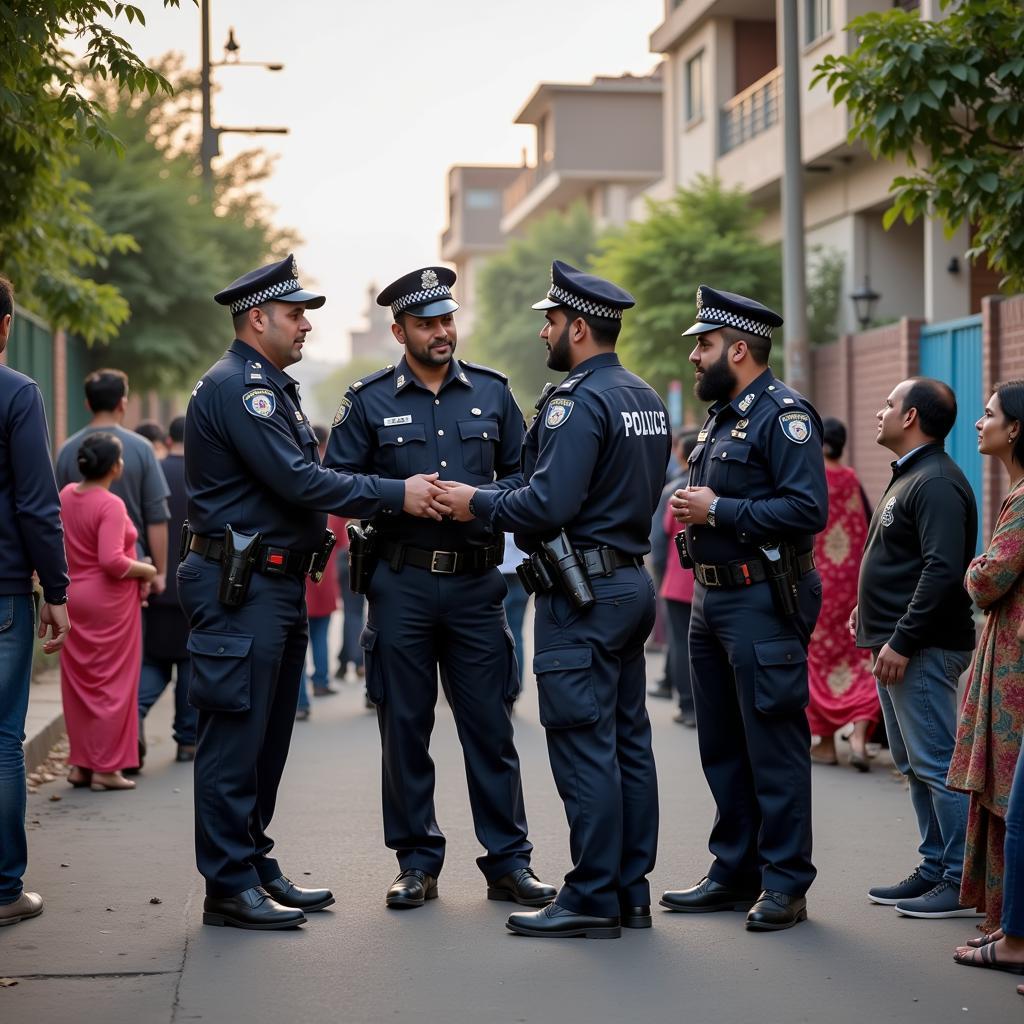Community Policing In Pakistan has emerged as a vital approach to enhancing public safety and fostering trust between law enforcement agencies and the communities they serve. This collaborative strategy aims to address the root causes of crime by involving citizens in identifying problems, developing solutions, and actively participating in crime prevention initiatives.
The benefits of effective community policing are multifaceted, ranging from improved police-community relations and reduced crime rates to increased public satisfaction with law enforcement services. One crucial aspect of this approach is its potential to address specific local concerns and tailor crime prevention strategies to the unique needs of each community. For aspiring police officers, understanding the qualifications for becoming a Station House Officer (SHO) is crucial, as SHOs play a vital role in implementing community policing initiatives. You can find more information about the qualifications for SHO in Punjab police Pakistan by clicking this link: qualification for sho in punjab police pakistan.
What is Community Policing and Why is it Important in Pakistan?
Community policing represents a paradigm shift from traditional, reactive policing models. Instead of solely focusing on responding to crime after it occurs, community policing emphasizes proactive measures, problem-solving, and partnerships with community members. This proactive approach can be particularly beneficial in a diverse nation like Pakistan, where varied cultural norms and societal structures influence crime patterns and community perceptions of law enforcement.
How Can Community Policing Enhance Public Safety in Pakistani Communities?
By actively involving citizens in crime prevention efforts, community policing strengthens the fabric of society. It empowers individuals to take ownership of their safety and security, fosters a sense of shared responsibility, and promotes collaborative problem-solving.
- Enhanced communication and trust between police and communities.
- Improved crime prevention through shared information and proactive initiatives.
- Increased public satisfaction with law enforcement.
- Reduced fear of crime and enhanced feelings of security within communities.
 Community Policing Patrol in Pakistan
Community Policing Patrol in Pakistan
Challenges and Opportunities in Implementing Community Policing in Pakistan
While the potential benefits are significant, implementing community policing in Pakistan faces unique challenges. Addressing these hurdles requires a comprehensive approach that considers the specific socio-cultural context and invests in building sustainable partnerships.
Overcoming Obstacles to Effective Community Policing
Overcoming deeply ingrained societal mistrust of law enforcement and fostering open communication requires sustained effort and dedicated resources. Training programs for police officers focused on community engagement and conflict resolution are essential for successful implementation. For women seeking government roles, the evolving landscape of community policing presents opportunities. Explore a range of government jobs for female in Pakistan through this link: government jobs for female in pakistan.
- Building trust between law enforcement and communities.
- Addressing resource constraints and logistical challenges.
- Ensuring adequate training for police officers in community engagement techniques.
- Promoting community participation and overcoming apathy.
The Role of Technology in Enhancing Community Policing
Technology can play a transformative role in community policing by facilitating communication, enhancing data collection and analysis, and improving transparency and accountability. From social media platforms to crime mapping tools, technological advancements offer valuable resources for strengthening police-community partnerships. Understanding the qualifications for becoming a sub-inspector is important for individuals interested in contributing to community policing efforts. Find out more about sub inspector qualification in Pakistan here: sub inspector qualification in pakistan.
How Can Technology Bridge the Gap Between Police and Communities?
By leveraging technology effectively, law enforcement agencies can enhance communication with residents, gather valuable feedback, and respond more efficiently to community concerns.
- Creating online platforms for reporting crime and providing feedback.
- Utilizing social media to disseminate information and engage with communities.
- Implementing crime mapping tools to identify crime hotspots and deploy resources strategically.
 Community Meeting with Pakistan Police
Community Meeting with Pakistan Police
“Community policing is not just a program; it’s a philosophy that requires a fundamental shift in the way we approach law enforcement,” says Dr. Ayesha Khan, a leading criminologist in Pakistan. “It’s about building trust, fostering partnerships, and empowering communities to take an active role in their own safety and security.” Another expert, Mr. Imran Ali, a retired police officer with extensive experience in community policing initiatives, adds, “The key to success lies in fostering open communication and mutual respect between police officers and the communities they serve. It’s about working together to identify and address the root causes of crime.”
In conclusion, community policing in Pakistan holds immense promise for enhancing public safety, building stronger communities, and fostering trust between law enforcement and citizens. By embracing collaborative problem-solving, leveraging technology effectively, and overcoming existing challenges, Pakistan can unlock the full potential of community policing and create a safer, more secure future for all its citizens.
FAQ
- What is the main goal of community policing? (To build partnerships between police and communities to address crime and improve public safety.)
- How does community policing differ from traditional policing? (It focuses on proactive problem-solving and community engagement rather than solely reacting to crime.)
- What are the benefits of community policing? (Improved police-community relations, reduced crime rates, increased public trust, and enhanced feelings of security.)
- What are the challenges to implementing community policing in Pakistan? (Building trust, resource constraints, and training police officers in community engagement.)
- How can technology enhance community policing? (Facilitating communication, improving data collection, and promoting transparency.)
- Who are some key stakeholders in community policing? (Police officers, community members, local government officials, and civil society organizations.)
- What is the future of community policing in Pakistan? (Continued development and adaptation of strategies to meet the evolving needs of communities.)
Need assistance? Contact us 24/7: Phone: +923337849799, Email: news.pakit@gmail.com, or visit us at Dera Ghazi Khan Rd, Rakhni, Barkhan, Balochistan, Pakistan.